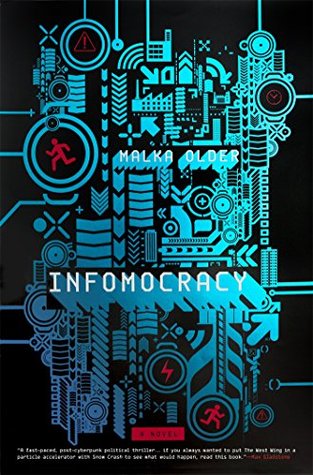More on this book
Community
Kindle Notes & Highlights
Every centenal, every collection of one hundred thousand neighbors, matters, whether it is spread over hundreds of miles in the tundra or crammed into a couple of overdeveloped blocks in Dhaka.
Twenty years ago, the people of the world came together in an unprecedented step to form a new international order. Since the first global election, war among participating jurisdictions has been eradicated, and prosperity and trade have spread. Policy1st believes in the principles of the elections. We offer you a clear, honest expression of our policy positions, and seek peace and economic growth in all our centenals. Visit one of our centenals, check us out on your comparison sheets, and use your Information to see what Policy1st can do for you.
The comparison sheets are formatted as a grid, with important topics across the top and governments down the side. There are pull-out sections for local issues at various levels—centenal, municipality, microclimate, island, time zone, language group. Each square offers the stated position of the government, an explanation of what that was calculated to mean in practice, and, if applicable, the deviation from that stated position indicated either by previous performance or current rhetoric. Citizens can even see a personalized grid with specific outcomes of each government for them: how much
...more
Opening the borders (such borders as remained, anyway) allowed the new governments to pull in more like-minded people, consolidating their holds on their centenals for the next election and stretching into neighboring ones as populations surged. Some journalist two decades ago dubbed the process mandergerrying, although it is also known as reverse osmosis, because it results in greater concentrations of like-minded—and, on occasion, racially or ethnically alike—constituents.
“Systems include their by-products; it all comes from the pattern of incentives they create. It’s how they make people think, how they make people behave.”
Except for that global few for whom borders didn’t matter, you were affiliated with where you were from. Kids born in Cuba were labeled communists, kids from the US imperialists, black kids from Ireland immigrants and opportunists. It didn’t matter if you disagreed or voted for the opposition. Your fate was ruled by the majority or the powerful minority, no matter how large.”
The Merita hotel chain offers rooms at a steep discount to people whose Information shows that they are interesting: as cocktail-chatter counterparts, as connections for entrepreneurs, as potential romantic partners. It’s a strategy to convince wealthier, duller clientele to pay a premium in order to share some sparkling conversation, or in the hopes that they will be able to pass for one of the glintelligentsia themselves.
The new Heritage coalition of wealthy, experienced global corporates ignored the accessibility of Information, produced their standard glossy misinformation, and not only took the Supermajority but won centenals where, analysts agreed, it was demonstrably not in the interests of the people living there to vote for them.
One of the first Information datasets to come out of a debate is which government got the most listeners. Some argue that it’s not a great determinant of the way the polls will move next, on the theory that people listen for entertainment value and vote out of self-interest, but Mishima has been with Information long enough to be cynical: most people’s interest is entertainment.
New York City, on the other hand, has fully embraced the micro-democracy concept. In a way, it’s the perfect place for it: a city already divided into boroughs and then neighborhoods of tightly knotted communities, each as different from the next as two countries half a world apart.
democracy is of limited usefulness when there are no good choices, or when the good choices become bad as soon as you’ve chosen them, or when all the Information access in the world can’t make people use it.
She wants to think that this is a sign that it is an empty threat, that they are targeting older voters for whom those old associations still ring strong. But then, those may be exactly the people who pose the greatest threat to the system: the people who can still remember, with rancor and longing and the inevitable distortions of time, what things were like before.
“They’re feeding different people different Information. Probably through these intranet adaptors for handhelds that we have intel about. I don’t know; is this better or worse than an actual war?” “It’s going to explode into war if it goes on much longer,” Nougaz assures her darkly.
Frustrated with the impossibility of getting people to make informed choices, stymied by the name-recognition problem and the celebrity factor and a million other quirks of neurobiology, the people who cared decided to manipulate the people who didn’t.
despite all the Information available, people tend to look at what they want to see.


